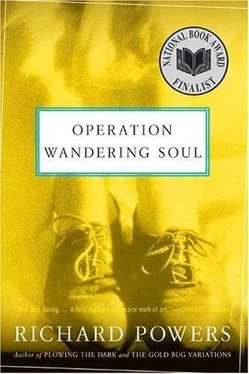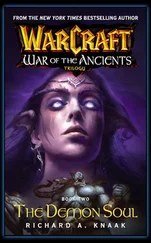Richard Powers - Operation Wandering Soul
Здесь есть возможность читать онлайн «Richard Powers - Operation Wandering Soul» весь текст электронной книги совершенно бесплатно (целиком полную версию без сокращений). В некоторых случаях можно слушать аудио, скачать через торрент в формате fb2 и присутствует краткое содержание. Год выпуска: 2002, Издательство: Harper Perennial, Жанр: Современная проза, на английском языке. Описание произведения, (предисловие) а так же отзывы посетителей доступны на портале библиотеки ЛибКат.
- Название:Operation Wandering Soul
- Автор:
- Издательство:Harper Perennial
- Жанр:
- Год:2002
- ISBN:нет данных
- Рейтинг книги:5 / 5. Голосов: 1
-
Избранное:Добавить в избранное
- Отзывы:
-
Ваша оценка:
- 100
- 1
- 2
- 3
- 4
- 5
Operation Wandering Soul: краткое содержание, описание и аннотация
Предлагаем к чтению аннотацию, описание, краткое содержание или предисловие (зависит от того, что написал сам автор книги «Operation Wandering Soul»). Если вы не нашли необходимую информацию о книге — напишите в комментариях, мы постараемся отыскать её.
Operation Wandering Soul — читать онлайн бесплатно полную книгу (весь текст) целиком
Ниже представлен текст книги, разбитый по страницам. Система сохранения места последней прочитанной страницы, позволяет с удобством читать онлайн бесплатно книгу «Operation Wandering Soul», без необходимости каждый раз заново искать на чём Вы остановились. Поставьте закладку, и сможете в любой момент перейти на страницу, на которой закончили чтение.
Интервал:
Закладка:
He tries to breach the subject with Burgess, by way of evading the latest, unfinished assignment for the week's literary chat. "Moses complex?" Burgess suggests, all but stroking his goatee. The Chief clearly missed his calling. What's a talking-cure guy doing wielding the big knife?
It earns Kraft hard currency with the boss to lay out the effects of an adolescence in transit on his adult sense of security. He says how continuous military-brat mobilization had him hit all the globe's hot spots by puberty. He spins out the case study of how, by ten, he'd left friends behind on each of four major landmasses. Even with Burgess as lay analyst, Kraft has to lie a little, invent an incriminated mechanism. Make up some plausible cathartic insight into his getting mixed up in a calling for which he never displayed the least vocation, a life of self-denial he could happily have sidestepped, a messianic stopgap that early experience should have told him was ludicrously irrelevant. Did he never, Burgess probes, dream of a career more adventuresome, more expansive? Well, yes. For years, little Kraft carried with him, three and a half times around the globe, despite the vicissitudes of local politics, his transposing horn. Somewhere deep in the AP archives, a grainy black-and-white glossy shows a scared foreign-service band, evacuated from Lahore at the start of the ’65 war to the region’s rock-solid American bastion, Teheran. In the poignant foreground, Ricky Kraft, doing his brave little John-John Jr. salute, clutches a French horn case as if it contained the tune the sick world was dying by inches to hear.
The following year, in British Guiana, as it overhauled itself into Guyana, Ricky made his first child's assault on Mozart. By Djakarta, overblowing had taken him into the high registers. As late as his two 2-year stints in what passed for accredited high schools, the terms "valve," "tubing," and "bore" still possessed not the slightest of health-professional overtones.
Simplicity came apart in a single night. That arctic year, back stateside, when it became clear that the energy crisis was not a temporary embargo. The year the president invoked one oxymoron, "the moral equivalent of war," against another oxymoron, "contemporary behavior." The year his father engineered his last international mission.
Bitterly frigid, a February beyond speaking. Four in the afternoon and already pitch black. A twenty-year-old stood on Huntington Ave outside the conservatory, waiting for the Arborway back to his chill flat in Jamaica Plain. His hand froze through his glove to the metal case handle, his breath vapor iced to the hairs of his upper lip, solidifying on contact with air. At that instant, he heard something — cracking mortar between the stones of the building he leaned against, the tensing of the rail at the approach of the trolley, the sounds of an old man being attacked with a baseball bat off toward Roxbury. With that noise — the sound of absolute zero — he would never be able to get warm again in this country.
At his apartment, the power had been out for hours and the pipes had burst. Geysers of water stood in midair, spectral faucet turbulences, ossified, Midased in place. Lying under every blanket he owned, their weave as slack as a stroke victim's mouth, the crystal interstices in his window glass thrown wide open to the outdoors' single-minded cold, Kraft remembered his way to a decision.
The age of music was over. He could play no longer. His horn uncoiled to its unmanageable seven feet. By semester's end, he cashed in his worthless education and headed home to his father, who had chosen North Dakota, the coldest, bleakest, emptiest state in the Union, to be a widower in. There, he slept for six months, shivering out the coma. Waking, Kraft began applying at once to pre-med programs.
Start again, from scratch. Better a few years late than eternally unprepared. University fell, then med school — four years in a pressurized bathyscaphe. Every test was a dry run for the Final Exam, whose hour no man could know but was coming eternally closer, its sole question akeady cribbed in that one afternoon's sickening presentiment. Assisting at his first coronary bypass, helping to clamp off and excise the saphenous vein from the meat-thick thigh and substitute it for the fouled canal-locks around the heart, Kraft felt only the placid terror of arrival. Not safe, not even here. But the operating theater was as central a station as any in which to wait for that obscure appointment laid out for him.
Even in residency at the most southerly hospital he could break into, the French horn accompanies him, superfluous baggage he's sworn off of but can't deep-six. It sits in its case, arm's length from his unfrequented bed, awaiting that postponed jam session of itinerant orchestra, midnight's clandestine musicians riffing into cleanly earned, twelve-bar sweat over sweet surreptitious saints marching someplace in.
And that's why he's a surgeon, Dr. Burgess. What does he win? Reasons, he would tell the Chief, explain nothing. Peculiarly American, this doctoring up of motive after the fact. The M.D. gives him something to fall back on; why not leave it at that?
Only overwork mitigates the sense of rendezvous, perpetually about to be missed. And this job's busier than any in the accepted register. He gives none of this away during Burgess's sherry-and-lit sessions. One does not tell the head of surgery that the career is just a holding pattern. Still, the Chief’s got a spot of it too. Cold consolation of supercompetence: earn a breathing space, prolong more lives than one terminates, bilge a patch of the spreading hematoma, nick the parabola, buy a minute, which must be sixty seconds more than nothing.
The hallways swarm with interns today. Each one grins at him from behind a patient work-up, inquiring politely after his potassium level. Kraft, after weeks of running this rat maze and still capable of getting lost in it, follows the colored-floor-stripe Baedeker, the No-Pay's heritage trail, deep into pathology's sanctum sanctorum.
In these halls the human calculus is ceaselessly differentiated with all the rote, overlearned ease of a child doing her lower times tables. Too many bodies even to be blase over. An «-space, imploded theater-in-the-round. Charity cases line the passages, capitalism's crash-test dummies and quantity grist. They drift, tubed down, stranded, pharmaceutically beached, cobbled up in assorted VA-surplus rolling furniture, talking to themselves, beyond all help but perfunctory patch job. Emergency gone quotidian. In residents' parlance, SHPOS. Subhuman pieces of shit.
Kraft makes rounds. The first pubescent post-op on the list isn't in his room. Probably off in the can getting high. Perhaps he should join the boy. But today's narcotics of choice are way out of his parlance. Two other must-sees from the same room are perched precariously on the windowsill, where they busily force flaming stuffed animals out through the barred windows to certain death six stories below.
The view from that window reveals an all-points, single-story hacienda sprawl as intricate and comprehensive as mold overwhelming a slice of damp bread. Kraft spots, in the switchback of streets that curl like machine parings, other hospitals, his previous rotations in the Byzantine farming-out that landed him here. The journeyman system has its pedagogic advantages. It lets him sample a mix of varying protocols and staffs. Each neighborhood (a euphemism in this unin-corporable metastasis of urban planning) has its exemplary disasters of the flesh. Each round is tailored to its geographical destiny: coronary with the haves; pede with the have-nots. Would that the have-nots had had a few fewer.
Every mini-mall, each net of streets beats its own unique socioeco-nomic pathologic path. For acquiring a rounded, hands-on account of general surgery, there's no substitute for touring the trenches. Short services are his entree into semi-autonomous regions just one burb over, those closed camps he could never have hoped to visit otherwise and survive. Join the army, see the world. Old idea of the study abroad, the foreign exchange program, the school field trip. Only this time, the museum is real.
Читать дальшеИнтервал:
Закладка:
Похожие книги на «Operation Wandering Soul»
Представляем Вашему вниманию похожие книги на «Operation Wandering Soul» списком для выбора. Мы отобрали схожую по названию и смыслу литературу в надежде предоставить читателям больше вариантов отыскать новые, интересные, ещё непрочитанные произведения.
Обсуждение, отзывы о книге «Operation Wandering Soul» и просто собственные мнения читателей. Оставьте ваши комментарии, напишите, что Вы думаете о произведении, его смысле или главных героях. Укажите что конкретно понравилось, а что нет, и почему Вы так считаете.












